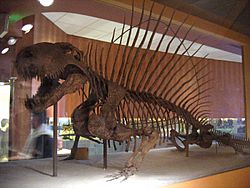Pelycosaur facts for kids
Quick facts for kids PelycosaursTemporal range: Upper Carboniferous – Upper Permian
|
|
|---|---|
 |
|
| Dimetrodon grandis skeleton at the National Museum of Natural History |
|
| Scientific classification | |
| Kingdom: | |
| Phylum: | |
| Superclass: | |
| Class: | |
| Order: |
Pelycosauria *
Cope, 1878
|
| Suborders | |
|
Caseasauria |
|
Pelycosaurs (say "PEL-ih-koh-sors") were some of the very first animals that looked a bit like reptiles. Their name means "basin lizards." They were not actually dinosaurs or true reptiles. Instead, they were early synapsids. Synapsids are a group of animals that eventually led to mammals, like us!
These amazing creatures lived on land. They first appeared about 320 million years ago, during the Pennsylvanian period. For about 40 million years, Pelycosaurs were the main land animals. Most of them died out during a huge event called the P/Tr extinction event at the end of the Permian period. However, a few survived into the early Triassic period. These survivors evolved into a new group called therapsids, which were the ancestors of all mammals.
Contents
What Pelycosaurs Looked Like
Pelycosaur fossils have been found mostly in Europe and North America. Some smaller, later Pelycosaurs have also been found in Russia and South Africa.
The Famous Back Sail
Many Pelycosaurs had a very tall "sail" on their backs. This sail was made of long bones that stuck up from their spine. It would have been covered by skin. Two main groups of Pelycosaurs, the edaphosaurids and the sphenacodontids, developed these sails.
Scientists think these sails might have helped the animals control their body temperature. They could have used the sail to warm up in the sun or cool down in the shade. The sails might also have been used to attract mates, like a colorful display.
Skin and Scales
Unlike modern reptiles, Pelycosaurs did not have scales all over their bodies. Fossils show that some parts of their skin were smooth. However, their bellies were covered in tough plates called scutes. These scutes looked a bit like reptile scales, but they were built differently.
Well-Known Pelycosaurs
Some of the most famous Pelycosaurs include:
- Dimetrodon: This one is well-known for its large back sail and sharp teeth.
- Edaphosaurus: Another Pelycosaur with a sail, but its sail had cross-bars.
- Sphenacodon: This Pelycosaur was related to Dimetrodon but did not have a sail.
- Ophiacodon: These Pelycosaurs had long, narrow skulls and likely lived near water.
Pelycosaur Family Tree
Scientists group Pelycosaurs into different families based on their features. Here is a simplified look at their family tree:
- Order †Pelycosauria
- Suborder †Caseasauria
- Family †Caseidae
- Family †Eothyrididae
- Suborder †Eupelycosauria
- Family †Edaphosauridae
- Family †Haplodontidae
- Family †Lupeosauridae
- Family †Ophiacodontidae
- Family †Sphenacodontidae
- Family †Varanopseidae
- Suborder †Caseasauria
- Order †Therapsida
Images for kids
-
Dimetrodon – a sphenacodontid
See also
 In Spanish: Pelicosaurios para niños
In Spanish: Pelicosaurios para niños




